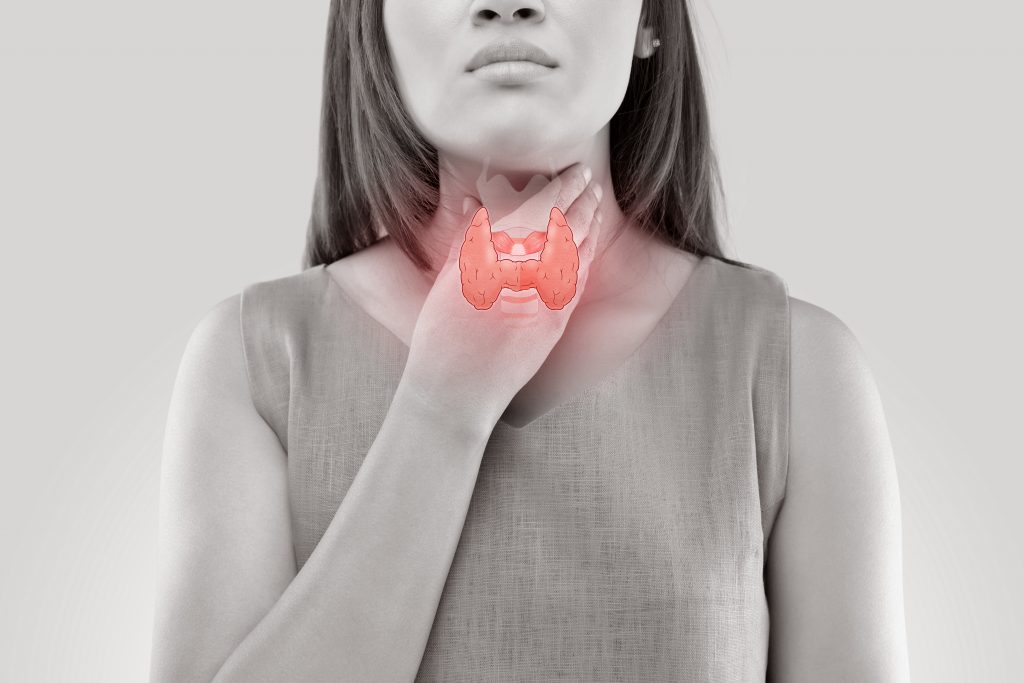What is Hashimoto’s Thyroiditis?
Hashimoto’s thyroiditis, also known as chronic lymphocytic thyroiditis, is an autoimmune condition that causes hypothyroidism or a slower functioning thyroid. With autoimmune conditions, the immune system perceives normal, healthy tissue as foreign and begins to attack it. In the case of Hashimoto’s, the immune system attacks and damages the thyroid gland, which lowers thyroid hormone levels by preventing the thyroid gland from being able to make enough thyroid hormone.
Hashimoto’s is the most common cause of hypothyroidism. It impacts 5% of Americans and women are 4 to 10 times more likely than men to have Hashimoto’s (and autoimmune conditions in general) (2).
Tests Used to Confirm a Hashimoto’s Diagnosis
Hashimoto’s is diagnosed based on high thyroid antibodies, symptoms, abnormal levels of thyroid hormones in the blood, and an ultrasound imaging of the thyroid gland (3).
Thyroid peroxidase (TPO) and thyroglobulin (TG) are proteins found in the thyroid gland that are involved in making thyroid hormones. Usually, when the immune system is attacking something it sees as foreign, it will produce antibodies against it. Antibodies against both proteins – TPO and TG are usually high in Hashimoto’s. Testing for these antibodies can be helpful in diagnosing Hashimoto’s.
Thyroid Stimulating Hormone (TSH) is a hormone made by the brain that tells the thyroid gland to make thyroid hormone. Free T4 and free T3 are the actual thyroid hormones. Checking your levels of TSH, free T4, and free T3 can help assess how well your thyroid is functioning.
Symptoms of Hashimoto’s
People with Hashimoto’s develop symptoms overtime. And since it’s not common practice to check for thyroid antibodies, it can be missed or worsen for years. If you suspect any sort of thyroid problems or have a family history of thyroid problems, ask your doctor to check the labs referenced above to rule out thyroid disease.
Sometimes, in the early stages of Hashimoto’s, people may actually have hyperthyroid symptoms – symptoms that reflect an overactive thyroid. This is because excess thyroid hormone may be released due to the thyroid gland being damaged by the immune system. Excess thyroid hormone in the body can cause symptoms like high heart rate, weight loss, difficulty sleeping, anxiety or nervousness, etc.
Over time however, Hashimoto’s leads to an under-active thyroid or hypothyroidism. Which is why many symptoms of Hashimoto’s overlap with hypothyroidism, including:
- Fatigue
- Hair loss
- Brittle nails
- Inability to tolerate the cold
- Sleepiness
- Constipation
- Muscle or joint pain and stiffness
- Depression or low mood
- Memory or concentration problems
- Swollen thyroid (goiter)
- Overall swelling – puffy face, swelling in legs or arms (edema)
- Reduced heart rate
- Infertility
- Understand PCOS Sugar Cravings & How to Stop Them - March 24, 2023
- The 4 Types of PCOS – What You Need to Know - February 24, 2023
- 4 Reasons Not to Keto with Hypothyroidism - January 27, 2023


Pingback:What is the Link Between Hashimoto’s and Gluten? – Hayat Nutrition